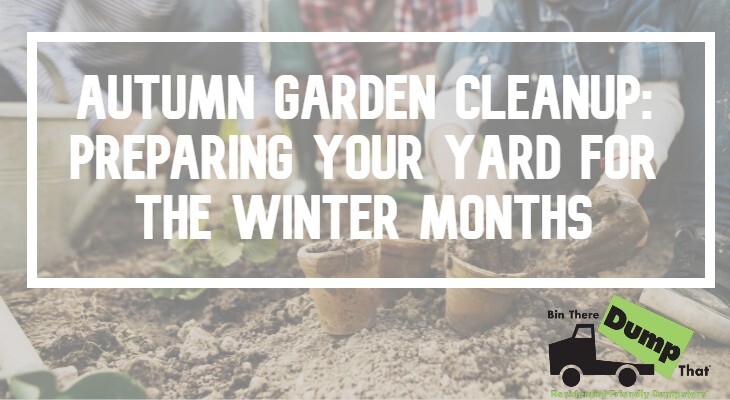
Autumn Garden Cleanup: Preparing Your Yard for the Winter Months
As the vibrant hues of summer begin to fade, and the crisp air of autumn settles in, it's time to shift our focus to the autumn garden cleanup. October flowers and fall sun annuals may still be blooming, but the time has come to prepare your garden for the approaching winter months.
In this article, we'll discuss when to shut down your garden, whether or not you should leave plants in the garden over the winter, and what you should add to your garden in the fall. So, let's get started on ensuring your autumn garden remains healthy and vibrant even through the fall landscape.

When Should I Shut Down My Garden?
The timing of shutting down your garden largely depends on your location and local climate. In general, the autumn garden cleanup should begin when the first frost is on the horizon or after the temperatures consistently drop below freezing. However, October flowers and fall sun annuals can continue to thrive in the cooler temperatures, so you don't need to rush.
Remove Annuals and Spent Plants: Start by removing any annuals that have finished blooming, such as fall sun annuals. These plants will not survive the winter, and removing them will prevent diseases from overwintering in your garden.
Prune Perennials: Trim back your perennials to about 3-4 inches above the ground after the first frost. This encourages healthy growth in the spring and prevents disease and pests from taking hold during the winter.
Clean Up Debris: Rake up fallen leaves, twigs, and other debris from your garden beds. This helps prevent the buildup of fungal diseases and provides a tidier look for your garden.
Divide and Transplant: Fall is an excellent time to divide and transplant perennials if needed. This gives them time to establish their roots before winter.
Mulch Beds: Apply a layer of mulch to your autumn garden beds to help regulate soil temperature and moisture levels during the winter months.
Looking for a FREE Quote?
Our Dumpster Consultants are waiting to help you find an affordable solution to your waste disposal needs; we can't wait to help you with your project!
Should I Leave Plants in My Autumn Garden Over Winter?
Leaving some plants in your autumn garden over the winter can be beneficial, especially if they are perennials or hardy shrubs. Here are some guidelines to help you decide which plants to leave and which to protect or move indoors:
Hardy Perennials: Perennials that are hardy in your zone can usually stay in the garden. However, it's a good idea to mulch around their base to provide extra insulation.
Shrubs and Trees: Established shrubs and trees can typically remain in the garden. Be sure to water them well in the fall to ensure they go into winter hydrated.
Tender Perennials: If you have tender perennials or non-hardy plants like tropicals, consider moving them indoors or providing winter protection, such as wrapping them in burlap or adding a layer of mulch.
Potted Plants: If you have potted plants, bring them indoors or place them in a sheltered area to protect them from freezing temperatures.
Bulbs: Bulbs like tulips and daffodils can stay in the ground but benefit from a layer of mulch to insulate them from extreme cold.
Remember that proper winter preparation is essential for the plants you leave in your garden. Mulch, watering, and providing wind protection can all help plants survive the winter months.

What Should I Add to My Garden in the Fall?
While fall is primarily a time for garden cleanup and preparation, there are still some tasks you can undertake to improve your garden's health and beauty:
Plant Spring-Blooming Bulbs: Fall is the ideal time to plant spring-flowering bulbs like tulips, daffodils, and crocuses. These bulbs need the cold winter months to develop and bloom in the spring.
Cool-Season Vegetables: Consider planting cool-season vegetables like lettuce, spinach, kale, and carrots in your garden. These crops thrive in the cooler temperatures of autumn and can provide you with fresh produce well into the fall as well as vibrant greens to your fall landscape.
Garlic and Onions: Plant garlic and onion bulbs in the fall for a bountiful harvest the following year. They require a long growing season, so getting them in the ground early is essential.
Cover Crops: If you have empty garden beds, consider planting cover crops like clover or rye. Cover crops help improve soil health, prevent erosion, and suppress weeds.
Trees and Shrubs: Fall is an excellent time to plant new trees and shrubs. The cooler temperatures and increased rainfall give them a chance to establish their root systems before the heat of summer.
The Importance of an Autumn Garden Cleanup
As the fall sun annuals continue to bloom and the October flowers add their vibrant colors to your garden, don't forget the importance of autumn garden cleanup. Knowing when to shut down your garden and how to prepare it for the winter months is essential for maintaining a healthy and beautiful garden year-round.
While some plants can stay in the garden, others may need special care or protection, and adding certain elements like spring-blooming bulbs can enhance the beauty of your garden in the seasons to come. So, roll up your sleeves, grab your gardening tools, and make the most of the fall landscape as you prepare your garden for winter's embrace.
No comments:
Post a Comment